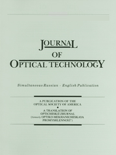
JOURNAL OF OPTICAL TECHNOLOGY
Scope & Guideline
Driving Progress in Optical Disciplines
Introduction
Aims and Scopes
- Optical Systems Design and Analysis:
Research on the design, modeling, and optimization of optical systems, including lenses, filters, and holographic elements, ensuring high performance and accuracy in various applications. - Materials for Optical Applications:
Exploration of novel materials and coatings, such as photonic crystals, nanostructured films, and advanced glass compositions, to enhance optical properties and functionalities. - Holography and Imaging Techniques:
Development and application of holographic methods for imaging, data storage, and sensing, focusing on both theoretical models and practical implementations. - Photonics and Laser Technologies:
Investigations into laser systems, including their design, modulation techniques, and applications in communication, sensing, and industrial processes. - Optical Measurement and Sensing:
Studies on optical measurement techniques, including interferometry and spectroscopy, aimed at improving the precision and capabilities of optical sensors. - Neural Networks and Computational Methods:
Application of machine learning and neural networks in optical imaging, data analysis, and system optimization, reflecting the integration of artificial intelligence in optical technology.
Trending and Emerging
- Integrated Photonics and Quantum Technologies:
Research is increasingly focusing on integrated photonics and quantum technologies, exploring their potential in communication, computing, and sensing applications, indicating a shift towards more advanced and compact systems. - Advanced Imaging Techniques:
There is a growing interest in advanced imaging techniques, including computational imaging and super-resolution methods, driven by the demand for higher resolution and more efficient imaging systems. - Machine Learning in Optics:
The application of machine learning and artificial intelligence in optics is gaining momentum, with researchers exploring its potential to enhance optical system design, image processing, and data analysis. - Sustainable Optical Materials:
A trend towards the development of sustainable and environmentally friendly optical materials is emerging, reflecting a broader awareness of environmental impacts and the push for greener technologies. - Opto-Electronic Integration:
The integration of optical and electronic components is becoming a prominent theme, with research focusing on hybrid systems that leverage the advantages of both domains for improved performance.
Declining or Waning
- Traditional Optical Communication Systems:
Research on conventional optical communication systems, which has seen reduced emphasis as newer technologies like quantum communication and advanced photonic systems gain traction. - Basic Optical Metrology Techniques:
Fundamental studies in basic optical metrology have decreased as the focus shifts toward more advanced and integrated measurement techniques that incorporate digital and computational methods. - Static Optical Elements:
The exploration of static optical elements, such as fixed lenses and traditional filters, appears to be declining as the field moves towards adaptive and dynamic optical systems. - Conventional Holography Techniques:
While holography remains an important topic, the focus on conventional methods without integration of modern technology and applications has diminished in favor of more innovative approaches.
Similar Journals
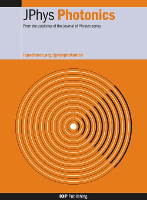
Journal of Physics-Photonics
Exploring the Spectrum of Photonic TechnologiesJournal of Physics-Photonics, published by IOP Publishing Ltd in the United Kingdom, is an esteemed Open Access journal that has been at the forefront of research in the field of photonics since its inception in 2018. With an impressive portfolio, the journal has achieved Q1 ranking in 2023 across multiple disciplines, including Atomic and Molecular Physics, Electrical and Electronic Engineering, and Electronic, Optical, and Magnetic Materials. This positions it among the leading journals in these areas, reflecting its significant influence and contribution to advancing knowledge and innovation. The journal aims to disseminate high-quality research findings that encompass a wide range of topics in photonics, promoting interdisciplinary approach that fosters collaboration among researchers, professionals, and students. With its commitment to open access, Journal of Physics-Photonics ensures that groundbreaking research is accessible to all, empowering a global audience to engage with and benefit from the latest advancements in photonic technologies.

OPTICA APPLICATA
Illuminating the Future of Optical ScienceOPTICA APPLICATA, published by Wroclaw University of Science and Technology, is a crucial platform for advancing knowledge in the fields of Atomic and Molecular Physics and Optics. With an ISSN of 0078-5466 and an E-ISSN of 1899-7015, this journal serves as a vital resource for researchers, professionals, and students seeking to explore the latest developments and applications in optical science and engineering. Although currently categorized in the fourth quartile in both Atomic and Molecular Physics and Electronic, Optical and Magnetic Materials, its commitment to publishing high-quality research articles, reviews, and technical notes remains unwavering. The journal covers diverse topics from practical applications to theoretical insights and fosters a collaborative environment for global contributors. While it does not offer an open access option, the journal is accessible through university libraries and institutional subscriptions. With an eye towards bridging academic research with real-world applications, OPTICA APPLICATA is well-positioned to influence advancements in photonics and materials science through ongoing issues from 1988 to 2024.

JOURNAL OF RUSSIAN LASER RESEARCH
Advancing Knowledge in Atomic and Molecular PhysicsThe Journal of Russian Laser Research, published by Springer, stands as a vital resource for researchers and professionals in the fields of atomic and molecular physics, as well as optics and engineering. With its ISSN 1071-2836 and E-ISSN 1573-8760, this journal has been disseminating groundbreaking research since its inception in 1994, with a dedicated focus on the advancement of laser technologies and their applications. While it currently holds a Q4 classification in both Atomic and Molecular Physics and Engineering categories, its commitment to fostering novel insights and innovative methodologies positions it as a promising platform for emerging studies within these disciplines. Although the journal does not offer open access options, it continues to draw attention with a growing citation index. By publishing diverse research articles, reviews, and critical discussions, the Journal of Russian Laser Research not only enriches academic literature but also serves as a stepping stone for students and professionals seeking to deepen their understanding of laser science and its myriad applications.

Optics Continuum
Transforming Ideas into Optical InnovationsOptics Continuum, published by Optica Publishing Group, is a pioneering open access journal dedicated to advancing the field of optics and photonics. Since its inception in 2022, this journal seeks to provide a vital platform for the dissemination of groundbreaking research and innovative developments across several interconnected domains, including electrical and electronic engineering, atomic and molecular physics, and material sciences focused on electronic, optical, and magnetic materials. With impressive rankings in Scopus—placed #384 in Electrical and Electronic Engineering and #109 in Atomic and Molecular Physics—the journal aims to engage a diverse readership comprised of researchers, professionals, and students, promoting collaboration and knowledge exchange. The journal's open access model ensures that cutting-edge research is readily available to all, nurturing an inclusive academic environment. For those interested in staying at the forefront of optics research, Optics Continuum is an essential resource that continuously enriches the global scientific community.
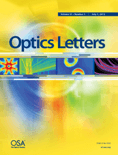
OPTICS LETTERS
Elevating the Standards of Optical ResearchOPTICS LETTERS is a premier academic journal published by the Optica Publishing Group, dedicated to advancing the field of optics and photonics. Since its inception in 1977, it has maintained a strong reputation for publishing high-impact research, holding a distinguished Q1 category ranking in Atomic and Molecular Physics, as well as Optics, making it a vital resource for researchers and professionals alike. With an impressive Scopus rank of #55 out of 224 in its field, OPTICS LETTERS continues to shape the discourse and innovation in optical science. Authors benefit from its extensive international reach, while readers gain access to cutting-edge studies that address both theoretical and applied aspects of optics. Although the journal currently does not offer open access options, its rigorous peer-review standards ensure that every publication meets the highest academic criteria, making it an essential journal for anyone looking to stay at the forefront of optical research.
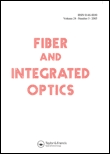
FIBER AND INTEGRATED OPTICS
Pioneering Insights in Optical and Fiber SciencesFIBER AND INTEGRATED OPTICS is a prominent academic journal published by TAYLOR & FRANCIS INC, focusing on the cutting-edge domains of optical and fiber technologies. Since its inception in 1977, the journal has journeyed through expansive developments in the fields of Atomic and Molecular Physics, as well as Electronic, Optical, and Magnetic Materials, boasting a converged publication history extending to 2024. With a solid reputation reflected in its Q3 rankings in both aforementioned categories, FIBER AND INTEGRATED OPTICS serves as an essential platform for researchers, professionals, and students to disseminate and explore innovative findings and methodologies. Although currently not offering Open Access, its scholarly contributions remain invaluable, fostering a deeper understanding and advancements in fiber optic applications and integrated optical systems. Situated in the United Kingdom, the journal continues to attract a diverse global audience, solidifying its significance in contemporary scientific discourse.

OPTICAL REVIEW
Fostering Global Collaboration in Optical SciencesOPTICAL REVIEW is a distinguished journal published by the Optical Society of Japan that serves as a critical platform for researchers, professionals, and students within the diverse fields of atomic and molecular physics and optics. With its ISSN 1340-6000 and E-ISSN 1349-9432, the journal has had a significant impact on the dissemination of knowledge since its inception in 1994, with a planned coverage until 2024. Although it currently holds a Q4 ranking in the 2023 category quartiles and is positioned at rank #152 out of 224 in the Scopus database, its contributions are vital for advancing optical science. This journal provides a venue for innovative research, review articles, and significant developments that drive the optical sciences forward. Although not categorized as Open Access, it remains an important resource for those seeking to deepen their knowledge and engage with leading-edge research in optics. With its base located at the Kudan-Kita Building in the heart of Tokyo, Germany, OPTICAL REVIEW is poised to continue fostering scholarly communication and collaboration on a global scale.
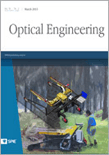
OPTICAL ENGINEERING
Transforming visions into optical realities.OPTICAL ENGINEERING, published by SPIE-SOC PHOTO-OPTICAL INSTRUMENTATION ENGINEERS, is a premier journal in the field of optical and photonic engineering, dedicated to advancing the science and technology of optics, photonics, and imaging systems. With ISSN 0091-3286 and E-ISSN 1560-2303, this esteemed publication has been contributing to the academic community since its inception in 1972, covering a wide array of topics within its converged years of operation. As a recognized entity, the journal is presently positioned in the Q3 quartile for Atomic and Molecular Physics and Optics, and in the Q2 quartile for Engineering (miscellaneous) as of 2023. The journal’s Scopus ranks reflect its impact and significance, being placed at #129 out of 307 in General Engineering and #137 out of 224 in Atomic and Molecular Physics. Although it does not operate under an open access model, the journal remains a vital resource for researchers, professionals, and students seeking the latest advancements in optical engineering. With a focus on publishing innovative research and technical advancements, OPTICAL ENGINEERING continues to be essential for driving progress in this crucial scientific field.
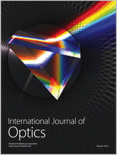
International Journal of Optics
Innovating Interdisciplinary Applications of OpticsWelcome to the International Journal of Optics, a distinguished publication dedicated to advancing the field of optics and its interdisciplinary applications. Published by HINDAWI LTD, this open-access journal has been pivotal in fostering knowledge since its inception in 2009. With a robust focus on atomic and molecular physics as well as electronic, optical, and magnetic materials, the journal has carved its niche within Q3 quartile rankings in these categories for 2023, signifying its growing impact and relevance in the scientific community. Researchers and professionals will find a rich repository of innovative and cutting-edge research articles that not only address fundamental aspects of optics but also explore practical applications across various domains. The journal's aim is to promote high-quality research dissemination, enhancing collaboration among scientists and ensuring that pivotal findings reach a global audience. Join us in exploring the dynamic world of optics—where your contributions help shape the future of science.

ACTA OPTICA SINICA
Fostering Insights in Electronic and Optical MaterialsACTA OPTICA SINICA is a distinguished journal dedicated to the field of optics and photonics, published by the Chinese Laser Press. With an ISSN of 0253-2239, this journal has been an essential resource since its inception, covering significant discoveries and advancements in atomic and molecular physics, electronic materials, and optical sciences. The journal is indexed in Scopus, achieving respectable ranks as Q3 in both Atomic and Molecular Physics, and Optics and Electronic, Optical and Magnetic Materials, reflecting its engagement with current research trends. Although it is not an open-access journal, ACTA OPTICA SINICA is hosted from Shanghai, China, and continues to serve as a vital platform for researchers, professionals, and students alike to disseminate and access high-quality peer-reviewed articles, ensuring its prominent place in the academic discourse related to optics and material sciences.